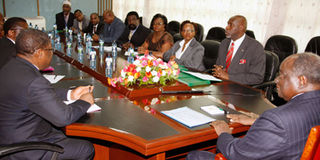CIC faults State over constitution implementation

President Kibaki meets with members of the Commission on the Implementation of the Constitution (CIC) at Harambee House office, Nairobi on March 30, 2011. Photo/PPS
The Commission for the Implementation of the Constitution (CIC) says impunity and a deliberate misinterpretation of the Constitution by senior government officials has delayed the implementation of the same.
In its quarterly report sent to the President, the Prime Minister and to Parliament, and released to the public Thursday, CIC said the Attorney General's office has not offered meaningful direction to the implementation process.
“The Office of the Attorney-General has fallen short of its mandate to give legal opinion in terms of faithful implementation of the Constitution and this has led to a lack of clarity in the implementation process,” the 70-page CIC report noted.
This is the second time that the CIC, which has in the past called the AG as an “impediment” to the implementation process, is attacking him.
The AG as per the Constitution has until August 26, 2011 to vacate office.
CIC has also accused the Clerk of the National Assembly, Mr Patrick Gichohi, for “being slow” to initiate a meeting between Parliament and the CIC on how the implementation will work.
“CIC has twice written to Parliament requesting for appointments,” the report noted, but there is no indication in the report, if audience was granted.
The commission works with Parliament’s Constitution Implementation Oversight Committee, and all correspondence to Parliament is addressed through the Clerk’s office.
The attack on the AG and politicians, plus the implication that powerful forces in government had deliberately set out to scuttle the implementation process, comes at a time when there are numerous pending suits in court and heated debate in the media about the enforcement of some of the clauses of the Constitution.
“CIC has noted with concern that there is an increasing trend by the Executive and some (MPs) to create grey areas regarding interpretation of the Constitution, even in the face of clear Constitutional provisions, this has the unfortunate propensity to create confusion and to delay implementation of provisions of the Constitution,” the commission noted in its report.
Leading the controversy is the push by MPs and some members of the Executive to delay the taxation of the perks of the current lawmakers until such a time that the pay is raised, or until after the expiry of the term of the 10th Parliament.
There’s also the pending legal tussle about the date of the next elections expected next year, alongside the furore about the process of nominating and appointing key constitutional office holders.
The CIC has also had to contend with a public spat, when the chairman Charles Nyachae and Prime Minister Raila Odinga expressed different views about whether MPs with positions in political parties, should be treated as State Officers as expressed under the Constitution.
The quarterly report comes against a backdrop of a push and pull between the CIC and the Attorney General on the contents of the Independent Electoral and Boundaries Commission Act that was recently assented to by the President.
Sources at the CIC said the commissioners have been in a meeting over the last two days going through the Act, clause by clause, and gauging if there are changes that have deliberately been inserted to frustrate the next elections.
Two days after the Act was assented to, it is yet to be circulated to the public.
The CIC now proposes that it should take the lead in the implementation process and that to reduce the number of changes to be made in the Bill prior to its tabling in Parliament, ministers should send staff who can make decisions concerning changes to the Bill, when the Bills are in the consultation stage.
With ten months already gone, and slightly less than two months left to the August 26, 2011 constitutional deadline for some of the crucial laws, only five laws have been signed into law.
These are: the Independent Electoral & Boundaries Commission Act, 2011; The Independent Offices (Appointment) Act, 2011; The Supreme Court Act, 2011; The Judicial Service Act, 2011 and The Vetting of Judges and Magistrate Act, 2011.
Some of the crucial Bills that have to be passed before the end of next month are the Elections Bill, the Political Parties Bill, a Bill on devolved governments among others.
Parliament is currently on recess until July 19, 2011 and it is not clear yet if the House will deliver on the passage of the Bills bearing in mind that the national Budget is also pending in the House.




